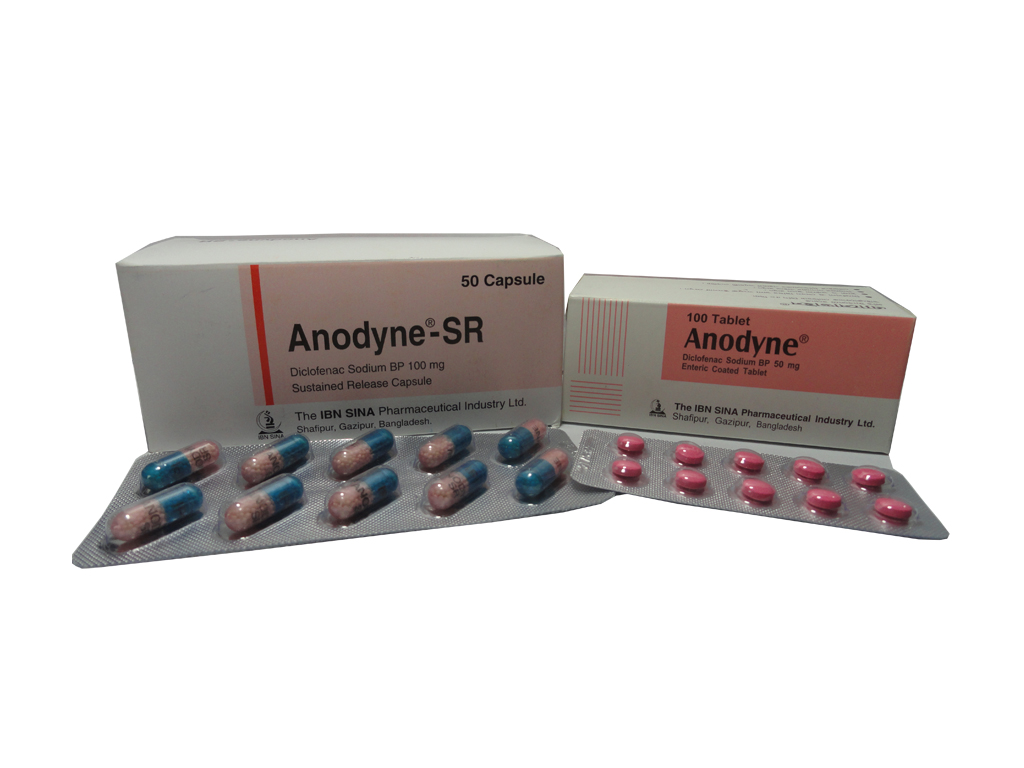
ANODYNE
DICLOFENAC SODIUM BP
| NAME | STRENGTH | PACK SIZE | DOSAGE FORM |
|---|---|---|---|
| ANODYNE 50 MG | 50 MG | 100 S | TABLET |
| ANODYNE 100 MG | 100 MG | 50 S | CAPSULE |
Anodyne Tablet: Each tablet contains Diclofenac Sodium BP 50 mg. Anodyne-SR Capsule: Each SR Capsule contains Diclofenac Sodium BP 100mg in pellet form.
Anodyne (Diclofenac Sodium) is one of the most important member of non-steroidal antiinflammatory drugs (NSAID). After taking Diclofenac, it absorbs from gastrointestinal tract and achieves peak plasma concentration within 2 hours. It inhibits the bio-synthesis of prostaglandin and thus acts as an analgesic.
Anodyne is indicated for Rheumatoid arthritis, osteoarthritis, ankylosing spondylitis, acute gout, lowback pain, dental pain, post operative pain, dysmenorrhoea, biliary colic etc. and other acute musculo-skeletal disorders such as: frozen shoulder, tendonitis, teno-synovitis, bursitis, sprain, strain and dislocation.
1 tablet 3 times daily after meal or 1 SR Capsule once daily. In severe cases, two SR capsule may be given at 12 hour interval.
Diclofenac is contraindicated in patients with peptic ulcer and in patients with known hypersensitivitis to Diclofenac. Besides if asthmatic attack increases due hypersensitivity to intake of Aspirin or this type of drug, in that case the drug must be avoided.
This type of drug should be given with caution in pregnant woman, lactating mother and those patients having a history of liver and kidney dysfunction and peptic ulcer.
Disturbance in stomach and intestine eg. epigastric pain, nausea, diarrhoea, dizziness, headache etc. may occur. Occasionally skin rash, peripheral oedema and abnormalitis of serum transaminase have been reported.
Diclofenac should not be prescribed during pregnancy,
unless there are compelling reasons for doing so. The lowest effective
dosage should be used. This type of drugs are not recommended during the
last trimester of pregnancy. Very small quantities of diclofenac may be
detected in breast milk, but no undesirable effects on the infant are to be
expected.
Since no experience has been acquired with diclofenac in pregnancy or
lactation, it is not recommended for use in these circumstances.
No drug interaction during treatment with diclofenac
have been reported.
Symptoms following acute NSAID overdoses are usually limited to lethargy, drowsiness, nausea, vomiting, and epigastric pain, which are generally reversible with supportive care. Gastrointestinal bleeding can occur. Hypertension, acute renal failure, respiratory depression and coma may occur, but are rare. Anaphylactoid reactions have been reported with therapeutic ingestion of NSAIDs, and may occur following an overdose. Patients should be managed by symptomatic and supportive care following a NSAID overdose. There are no specific antidotes. Emesis and/or activated charcoal (60 to 100 g in adults, 1 to 2 g/kg in children) and/or osmotic cathartic may be indicated in patients seen within 4 hours of ingestion with symptoms or following a large overdose (5 to 10 times the usual dose). Forced diuresis, alkalinization of urine, hemodialysis, or hemoperfusion may not be useful due to high protein binding.
Store in a cool (below 30°C) and dry place protected from light and moisture. Keep out of the reach of children.
Anodyne Tablet: Each box contains 10x10's tablets in blister strip.Anodyne SR Capsule: Each box contains 5x10's SR capsules in blister strip.
